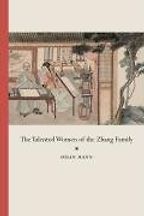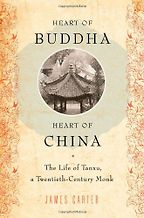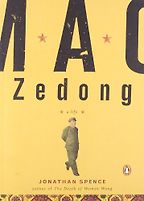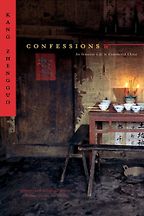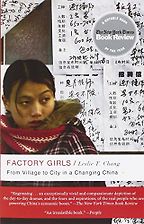The choice is overwhelming on the China shelf of any bookshop – everything from macroeconomic tomes to travel guides. Why did you pick ‘life stories’ as your theme?
One of the real challenges for foreigners trying to think about China, and have it make sense to them, is to really get to think of it as a country populated by individuals. There’s a strong tendency in so much of the writing about China to deal in broad generalisations, in which we lose the diversity of the population. So focusing on biography, or life stories, seemed to be a good way to go against the grain.
Your first book is Susan Mann’s The Talented Women of the Zhang Family. What’s it about, and what period is it set in?
It’s set in the Qing dynasty, mostly in the 19th century, and it tries to bring to life the experiences of the women of a single family. One of the challenges of biographies of women in different settings is the limited records that are left of their lives. But with these particular women, they wrote a lot of poetry, and Mann uses that to great effect. She also experiments with the form of writing. She’s doing something that in Chinese would be called waishi, which means ‘unconventional history’. As Mann describes it, it records things that might have happened, based on invented or unauthenticated sources or on gossip. So she takes what these women wrote, and then she tries to weave fully textured lives around them, drawing on everything that could possibly help to illuminate their lives. These were elite women – but the fact that they were women also makes them one of the groups that gets left out of the historical record.
Do you feel the history of China is particularly male dominated?
Not particularly. But there was a tendency until recently for historical writing about most parts of the world to focus largely on male experiences. I think that with China there’s a special challenge, in that a lot of the general works don’t capture how variegated the lives were of women of different social groups, different classes, even different periods. There’s a tendency to think about an unchanging oppression of Chinese women. But one of the things this book captures is the degree to which women of elite groups, and in particular parts of the country, would be much more literate, much more engaged with the life of the mind than is sometimes imagined when there’s this focus purely on the patriarchal structures that kept women down.
Your description reminds me of a book which I’m reading now, and which isn’t on your list – Jonathan Spence’s The Death of Woman Wang.
There are a lot of similarities. The Death of Woman Wang is a book which I frequently teach, and it was one of the first books I read as a student when it first came out in the late 1970s. It’s one of the books that inspired me to become a Chinese historian, and it’s a lovely work. Spence takes a woman who only shows up in the record through one incident – a crime – so he has to take much greater liberties than Susan Mann, who’s dealing with women who left more traces of themselves to be used as building blocks. But there’s definitely a kinship between the books.
Mann’s book also draws on China’s long and well-established tradition of biographical writing. One way she tries to bring the reader into China is not just through Chinese lives, but also by adapting some of the forms of Chinese biographical and historical writing. It’s a tradition that goes back to Sima Qian in the first century BC, who is sometimes spoken of as the Chinese Herodotus or the Chinese Thucydides, and who interspersed accounts of great events with accounts of individuals.
It’s cruel of us to allow you only five books. Let’s move on to your second, James Carter’s The Life of Tanxu. Who is Tanxu, and what times did he live through?
He’s a man who, after a fairly ordinary family life, went through a process of religious discovery which led him to become an itinerant monk, establishing Buddhist temples across China. He also lived through many of the most important events of the 20th century. Part of the conceit of the book is to cast familiar events – such as the Japanese invasion of China in the 1930s – in a new light, by keeping the focus on an individual’s life, and then telling the story of a nation’s transformations around that.
The last century was such a violent period of China’s history. The choice of a Buddhist monk as the individual through which to relate it seems quite unique.
That’s a good point. In the book there’s a lot of juxtaposition between the quiet contemplation of life in a temple and Tanxu’s engagement with what’s going on around him. But what is striking – and we don’t think of these as going hand in hand – is that Tanxu has to be seen as a nationalist as well as a spiritual seeker. Carter argues that what he was doing was one way to strengthen China – to strengthen its soul as part of the effort to strengthen it as a polity.
Your third choice is by Jonathan Spence, whose The Death of Woman Wang we already touched on. You’ve chosen Mao Zedong: A Life – a biography that is one among many. Why are we so obsessed with this man?
He’s an incredible figure, in almost any way you think about it, to have led this transformative revolution that turned China upside down and inside out, and then go on to lead the country for the first 27 years after the establishment of the People’s Republic of China. So he was involved in dramatic events, he was a larger-than-life figure, and also there are distinct stages in his life in which he operates in different ways. We see him first as a rebel figure and then also as an almost godlike holder of enormous power. So it’s not hard to see why a lot of biographers would be drawn to the drama of that kind of a life.
Most Mao biographies that people might be familiar with – I’m thinking of Jung Chang and Jon Halliday’s, or Li Zhisui’s, Mao’s doctor – are openly critical to the point of demonising him. Is this one more impartial?
I think there are actually two kinds of Mao biography that come to mind. Those two that you mention do present Mao as a despicable figure – a monster more than a man. But before that probably the most famous biography of Mao was Edgar Snow’s Red Star Over China, which is a very romanticised vision of Mao’s life. It focuses on Mao the rebel, before he came to power, whereas the more demonising biographies tend to focus on Mao’s life after taking power. Or, in the case of Jung Chang and Jon Halliday’s, they take the most evil period of Mao’s life and then read his entire earlier life through the prism of his most brutal actions while in power.
What I like about Spence’s biography, which is very short, is that it presents us with a very human Mao, both in his accomplishments and in the tragedies that he foisted on the country. So you get a more rounded picture – but that doesn’t mean impartial, that it’s a balance sheet of positives and negatives. The book is driven by a vision of a flesh-and-blood individual who accomplished some amazing things, and made some very terrible mistakes.
Could you imagine someone writing a flesh-and-blood biography of Hu Jintao, or Xi Jinping, or any other more current Chinese leader?
Not one that would make for compelling reading! Though I recently wrote a piece for Time magazine about how when Deng Xiaoping took power after Mao, he seemed in comparison a more down-to-earth, unexciting and pragmatic character – but now, in comparison to Hu Jintao, Deng seems positively charismatic. So we’ve had a kind of steady progression away from larger-than-life Chinese leaders.
Your fourth book is Kang Zhengguo’s Confessions. I take it this is an addition to a familiar genre, perhaps best epitomised by Jung Chang’s Wild Swans – memoirs of living through the Cultural Revolution.
I wasn’t excited about reading this book at first, because I thought it would be yet another familiar account of suffering during the Cultural Revolution. And yet the book really won me over. And that’s partly because it deals with the 1950s as well as the Cultural Revolution of 1966 through 1976. Indeed it goes beyond that to the author’s subsequent journey to the United States. I think the book loses a lot when it gets past the 1980s, but the earlier parts are an amazing evocation not just of suffering but also of daily life in the 1950s, 60s and 70s.
So what’s unique about Kang’s story in terms of what he witnessed?
One of the things that’s special, if not unique, is that he grew up in an urban setting – the city of Xi’an – but he was then exiled to the countryside, and lived a significant part of his life in an ordinary village. So he’s someone who experienced both urban and rural China. Another thing that’s different from the other memoirs is that he wasn’t a believer in Mao’s ideology who then had the scales fall from his eyes. He presents himself as being an iconoclastic figure from childhood – the kind of person who was always doubtful of orthodoxy. So that’s refreshing as a part of the genre.
Five Books interviews are expensive to produce. If you're enjoying this interview, please support us by donating a small amount.
But what’s most refreshing is that while we get a lot of harrowing accounts of his time in labour camps and so on, he tells his story with continual flashes back to his childhood. Meals or conversations while he was in a jail cell, or while he was doing forced labour, trigger Proustian memories – sending him back ten or 20 years. And so we learn about his relationship to another iconoclastic figure, his Buddhist grandfather, who had collaborated with different political regimes and tried to find a way to continue living an eccentric life in different settings. He also tells you about what street food tasted like in Xi’an in the early 1950s. There are just a lot of lovely vignettes.
Was the street food as oily then as it is today?
Hah, well he misses some of the dishes of that time. The funniest thing he mentions related to food – and it’s hard to imagine anything funny related to a period of terrible famines – is that during the Great Leap Forward famine, the government got concerned about how few calories people were taking in. One thing they did was try to get people to move around less, so that they wouldn’t expend energy. So they briefly lightened up the censorship mechanisms that prevented the showing of most foreign films, and you were suddenly able to see movies that would previously have been thought of as subversive, because it was one way to get people to just sit there. This is one angle on a period of suffering that, without minimising the suffering, makes you think about it in a totally new way – and that’s what I love about an illuminating biography.
I often get the feeling that there are so many amazing stories from China in the 1950s to 80s, just like this one, but which won’t get told because to the people who would tell them they were completely mundane – all of their neighbours lived through the same circumstances. While astonishing to the Western ear, these stories are completely run of the mill to a certain Chinese generation.
That’s very true. I guess one thing we have at least, in addition to the memoirs that do get told, are works of fiction that have that evocation of the ordinary. And Yu Hua’s To Live is one of my favourites – a novella that tries to give you the sense of an ordinary life lived through these incredibly extraordinary times of revolution.
You’re cheating again!
I know – you got me.
Your fifth pick is Leslie Chang’s Factory Girls, which tells, in wonderful detail, the stories of young women who leave their families across China’s countryside to work in the factories of southern China. What do you love about this book?
I love the way it’s written, and the way that Chang blends her own life story in with it. She pairs the story of her family’s migration out of China to the United States, where she grew up, to the movement of young women from rural China to urban China today. And she sets up a parallel between the way that American cities were transformed by overseas immigrants who fuelled the American industrial rise, with the enormous migration today – that doesn’t involve crossing an ocean or leaving one country for another – of rural dwellers to the world of Chinese cities.
I also love the way she brings to our attention the distinctive personalities of young Chinese women. She describes them as working in very difficult conditions, but often experiencing them as liberating, because they have so much more freedom and control over their private life than they had in their villages, where male-dominated family structures remain powerful.
For a Western journalist and author – even if she is ethnically Chinese – do you think it’s hard to uncover the real personality of someone natively Chinese?
Absolutely, but actually you put your finger on something very significant. I think the fact that Leslie Chang is ethnically Chinese did make a difference in her ability to tell certain kinds of story, and she’s fairly upfront about that. At one point she goes back to visit the village of one of the girls who she’s got to know, and she’s told she’ll be sleeping in the bed with the other females of the family. It’s hard to imagine that kind of entrée into local family life if she hadn’t been ethnically Chinese.
But I think there’s a challenge for any ethnographer – and this book is in ways very much like an ethnography – to get at people’s real opinions and feelings. You have to invest a lot of time into it, and she spent a lot of time, over an extended period, getting to know these people, and getting them to share things with her that they wouldn’t have in a more casual interview setting.
Her husband is Peter Hessler, who’s written a fair few Chinese life stories himself.
It’s quite amazing to think of two members of a couple who have written books that are very different from one another, but share skilful writing and deep empathy for the people that they’re describing.
Get the weekly Five Books newsletter
I also loved being able to end with this book, having begun with Susan Mann’s. Mann’s book is an effort to bring to life the experience of privileged women who were ignored in the historical record; whereas Chang’s is about less privileged women a century later who, in the specificity of their experience, are also ignored.
Before I let you go, I’ll cave in and allow you a sixth recommendation – what would you suggest to a China novice as their first book about the country?
For China as it is now, Peter Hessler’s Country Driving is a wonderful place to start. It gives you a sense of the sheer speed at which the country is being transformed, and how at a human level people are experiencing and dealing with that.
Interview by Alec Ash
Five Books aims to keep its book recommendations and interviews up to date. If you are the interviewee and would like to update your choice of books (or even just what you say about them) please email us at editor@fivebooks.com
